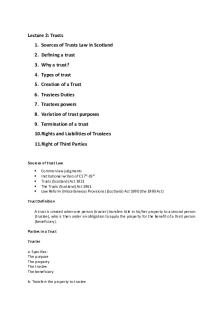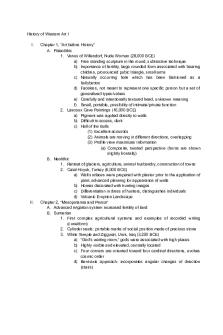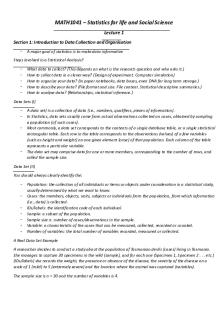Whatisanation-Renan- Notes PDF

| Title | Whatisanation-Renan- Notes |
|---|---|
| Author | Chiara Bordignon |
| Course | Building the Italian Nation |
| Institution | Royal Holloway, University of London |
| Pages | 3 |
| File Size | 79.7 KB |
| File Type | |
| Total Downloads | 93 |
| Total Views | 129 |
Summary
Stefano Jossa...
Description
WHAT IS A NATION - Ernest Renan
Misunderstanding! Forms of human society variety o Tribes o Nations o Community o Confederations Mistake: “race” confounded with “nation” and ethnographic/linguistic groups = sovereignty
I
Break up of Charlemagne’s empire western Europe divided in nations o Everyone tried to established a hegemony on the others, eventually failing Nations: historically recent Roman domination: fatherland o Loved, but not nation in modern terms o Split between East and West Germanic invasion basis for the existence of nationalities o “imposed dynasties and a military aristocracy […] and lent their names to these places” Treaty of Verdun: traced divisions Characterized by o Conqueror adopted the language of conquered Christianity o Conquerors forgot their language Unity: brutally established Historically, different race nation Nations: great deal in common and forgot many things Nationality is different from race
II
“a nation is above all else a dynasty representing an ancient conquest, one first accepted and then forgotten by the mass of the people” but it is not an absolute law! (Switzerland, USA…) “nation can exist in the absence of the dynastic principle”
And so? Which criterion? A: race as a criterion
“primordial right” principle of nations substituted by ethnography o A great mistake which lead to disasters Tribes: extension of a family thus race was important But then with Roman Empire and Christianity ethnography remote from government Barbarian kingdoms: only by strength, no race Charlemagne: different raced Verdun, no attention to race Frontiers: lacked ethnographic tendency “Ethnographic considerations have therefore counted for nothing in the constitution of modern nations” There are no pure races Double meaning of race o Anthropologist: blood relation
o o
o
Historical philologist: historical facts, no physiological unity Race as something made and unmade “zoological origins of humanity are tremendously anterior to the origins of culture, civilization, and language. The primitive Aryan, Semitic, and Touranian groups had no physiological unity. These groups are historical facts that had a place at a certain epoch let’s say fifteen or twenty thousand years ago whereas the zoological origins of humanity disappear in incalculable shadows” No political applications
B: as race, the same for language
Different nations speak the same language In one nation more languages are spoken Language does not identify race thinking of it in this way gives political importance Language is not a criterion for nationhood o Otherwise limited and partial cultural understanding of a nation “man is a reasonable and moral being before he is penned up in this or that language, a member of this or that race, or a participant in this or that culture.”
C: nor relation
Religion was a state religion There is no longer religion of state
D: nor community of interest
It is more about commercial treaties
E: geography and national frontiers play a significant role in nations’ division
It influenced historical movement But not an arbitrary rule Geography is just the substratum, nothing more “Man is everything in the formation of this sacred thing that one calls a people. Nothing material suffices. A nation is a spiritual principle resulting from the profound complexities of history it is a spiritual family, not a group determined by the lay of the land.”
A nation “is a soul, a spiritual principle” The past and the present o “a rich legacy of memories” o “the desire to live together”, “to invest in the heritage” received “having common glories in the past and a will to continue them in the present; having made great things together and wishing to make them again” “Suffered together”, I said, for shared suffering unites more than does joy.” “the feeling of sacrifices made and those that one is still disposed to make” “A nation never has a true interest in annexing or holding territory that does not wish to be annexed or held” “Man remains, his desires, his needs”
III
Summarizing: “Man is a slave neither of his race, his language, his religion, the course of his rivers, nor the direction of his mountain ranges. A great aggregation of men, in sane mind and warm heart, created a moral conscience that calls itself a nation” – “As long as this moral conscience proofs its strength by
sacrifices that require the subordination of the individual to the communal good, it is legitimate and has the right to exist”...
Similar Free PDFs
Popular Institutions
- Tinajero National High School - Annex
- Politeknik Caltex Riau
- Yokohama City University
- SGT University
- University of Al-Qadisiyah
- Divine Word College of Vigan
- Techniek College Rotterdam
- Universidade de Santiago
- Universiti Teknologi MARA Cawangan Johor Kampus Pasir Gudang
- Poltekkes Kemenkes Yogyakarta
- Baguio City National High School
- Colegio san marcos
- preparatoria uno
- Centro de Bachillerato Tecnológico Industrial y de Servicios No. 107
- Dalian Maritime University
- Quang Trung Secondary School
- Colegio Tecnológico en Informática
- Corporación Regional de Educación Superior
- Grupo CEDVA
- Dar Al Uloom University
- Centro de Estudios Preuniversitarios de la Universidad Nacional de Ingeniería
- 上智大学
- Aakash International School, Nuna Majara
- San Felipe Neri Catholic School
- Kang Chiao International School - New Taipei City
- Misamis Occidental National High School
- Institución Educativa Escuela Normal Juan Ladrilleros
- Kolehiyo ng Pantukan
- Batanes State College
- Instituto Continental
- Sekolah Menengah Kejuruan Kesehatan Kaltara (Tarakan)
- Colegio de La Inmaculada Concepcion - Cebu















